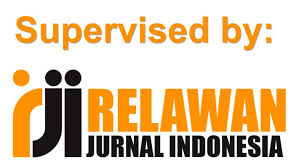Islamic Religious Education Teachers’ Strategies In Improving Students’ Religious Literacy At Smp Islam Cendekia Darussalam
DOI:
https://doi.org/10.37092/el-ghiroh.v23i2.1304Keywords:
Teacher Strategy, Religious Literacy, Students’ CharacterAbstract
This study aimed to analyze the strategies of Islamic Religious Education (IRE) teachers in enhancing students’ religious literacy. The focus of the research was on the planning, implementation, supporting and inhibiting factors, and the implications of teacher strategies for students’ religious literacy. This research used a qualitative descriptive approach with data collected through observation, interviews, and documentation. Data were analyzed through the stages of reduction, display, and conclusion drawing. The findings indicated that in the planning stage, teachers designed learning activities by integrating religious literacy into both classroom instruction and extracurricular programs. In the implementation stage, teachers applied various strategies such as project-based learning, the habituation of religious practices, and the use of digital media to strengthen students’ engagement. Supporting factors included school facilities, parental involvement, and students’ motivation, while inhibiting factors consisted of limited instructional time, variations in students’ literacy levels, and technological challenges faced by teachers. The study concluded that the strategies of IRE teachers significantly improved students’ abilities in reading, understanding, and applying Islamic teachings in daily life. Moreover, these strategies fostered a culture of religious literacy and strengthened students’ religious character. The results of this study implied that such strategies could serve as a model for other schools and suggested future research to explore the long-term impacts of religious literacy programs.
Downloads
References
Abdullah, A. (2017). Pendidikan Agama Islam dalam Perspektif Kontemporer. Jakarta: Rajawali Pers.
Aisyah, N. (2020). Model Literasi Keagamaan di Sekolah. Bandung: Alfabeta.
Azizah, R. (2020). Strategi Guru dalam Meningkatkan Literasi Religius. Malang: UIN Maliki Press.
Azra, A. (2012). Pendidikan Islam: Tradisi dan Modernisasi di Tengah Tantangan Milenium III. Jakarta: Kencana.
Hakim, L. (2009). Metode Penelitian Pendidikan. Bandung: Remaja Rosdakarya.
Hidayat, R. (2018). Strategi Pembelajaran PAI di Sekolah Menengah. Yogyakarta: Pustaka Pelajar.
Hidayat, R. (2020). Inovasi Pendidikan Islam di Era Digital. Bandung: Pustaka Setia.
Johnson, D. (2014). Educational Psychology: Theories of Learning. New York: Pearson Education.
Joyce, B., & Weil, M. (2010). Models of Teaching (8th ed.). Boston: Allyn & Bacon.
Karim, M. (2021). Transformasi Pendidikan Islam di Indonesia. Jakarta: Rajagrafindo Persada.
Lestari, S. (2020). Literasi Keagamaan dalam Pendidikan Islam. Yogyakarta: Deepublish.
Miles, M. B., & Huberman, A. M. (2014). Qualitative Data Analysis: A Methods Sourcebook. Thousand Oaks, CA: Sage.
Moleong, L. J. (2017). Metodologi Penelitian Kualitatif. Bandung: Remaja Rosdakarya.
Muhaimin. (2016). Paradigma Pendidikan Islam: Upaya Mengefektifkan Pendidikan Agama Islam di Sekolah. Bandung: Remaja Rosdakarya.
Munawir, A. (2018). Pengembangan Kurikulum Pendidikan Agama. Surabaya: UIN Sunan Ampel Press.
Mustofa, A. (2020). Strategi Pembelajaran Literasi Religius di Era Revolusi Industri 4.0. Jakarta: Prenadamedia Group.
Prasetyo, A. (2021). Kebijakan Pendidikan dan Literasi Keagamaan. Yogyakarta: Pustaka Baru Press.
Rahman, F. (2019). Pendidikan Karakter dan Literasi Keagamaan. Jakarta: Rajawali Pers.
Sanjaya, W. (2015). Strategi Pembelajaran Berorientasi Standar Proses Pendidikan. Jakarta: Kencana.
Santoso, H. (2021). Literasi Keagamaan dan Tantangan Globalisasi. Malang: UMM Press.
Slavin, R. E. (2005). Educational Psychology: Theory and Practice. Boston: Allyn & Bacon.
Sugiyono. (2019). Metode Penelitian Kuantitatif, Kualitatif, dan R&D. Bandung: Alfabeta.
Suryana, D. (2018). Pengantar Pendidikan Anak di SD/MI. Jakarta: Prenadamedia Group.
Syafii, A. (2019). Pendidikan Islam dan Multikulturalisme. Yogyakarta: Ar-Ruzz Media.
Tomlinson, C. A. (2014). The Differentiated Classroom: Responding to the Needs of All Learners (2nd ed.). Alexandria, VA: ASCD.
Wahyuni, S. (2019). Pengembangan Pembelajaran Pendidikan Agama Islam. Bandung: Remaja Rosdakarya.
Warsah, I. (2020). Integrasi Literasi Religius dalam Pendidikan Islam. Bengkulu: IAIN Bengkulu Press.
Wulandari, T. (2021). “Literasi Keagamaan pada Peserta Didik SMP”. Semarang: Unnes Press.
Downloads
Published
How to Cite
Issue
Section
License
Copyright (c) 2025 Yusuf Syaikhoni, Erham As'ari, Ani Maghfiroh

This work is licensed under a Creative Commons Attribution-NonCommercial-ShareAlike 4.0 International License.









